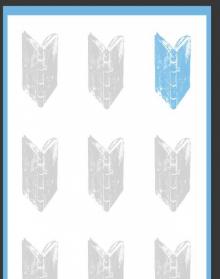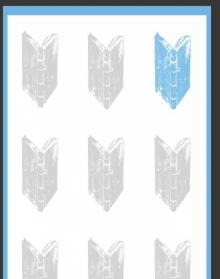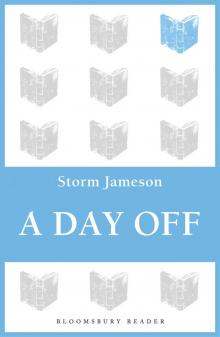- Home
- Storm Jameson
The Black Laurel Page 7
The Black Laurel Read online
Page 7
Gary said nothing.
Moving quietly, Lucius got up and opened the door widely: in the brilliant sunlight the desert outside, of rubble, seemed an hallucination: the reality was the bed of herbs.
“Did you plant them?”
“Of course,” Lucius said smiling. “And I’ve been lucky. Every time it rains and I have to shift my bed — it comes through in so many different places — I’m pleased because of my herbs. I can’t, you know, water them.”
“You a gardener!”
“Why not? I need something. When I was in Buchenwald the Nazis destroyed all my books and turned my house into a youth hostel. It’s now, I’m told, an English H. Q. or an army school of some sort.”
“I can get it back for you.”
His house — the family house of the Gerlachs since 1720. Gary saw it with great clearness. Ten miles outside Cologne, an avenue of lime-trees planted at the same time as the house led to the courtyard with the fountain: the wings, lower than the main building, had a lightness repeated in the double stairway of the entrance: the house faced west, turning its back on a prehistoric mound covered thickly and darkly with pines, which succeeding generations of Gerlachs had wanted to cut down. Lucius’s father indeed began the work — and only gave way with a bad grace to the cries of outraged professors. When he inherited, Lucius devoted almost all his income to two things — the vines and the library. The vines, descending in four waves of patient labour — of centuries — they were there before the house. . .
“Why should you?”
Day after day when he came back to it after the other war, he drew the house closer round him; its rooms, filled even in winter with a clear light, held together his childhood and his restless future. What had made him indifferent? Baffled, Gary asked,
“What are you living on? Forgive me for asking questions, but. . .”
“Why shouldn’t you?” Lucius said warmly. “Oddly enough, they didn’t touch my mother’s fortune. She died while I was in Buchenwald. My money is of course frozen, but I have her rings — which Rudi will sell. I simply spend the money on him and myself. In fact, money is scarcely any use. I need so little. Besides — what is there to buy?”
Freedom? Your own books? A shelter where at least the roof doesn’t leak. . .
“Lucius —”
“Well?”
“If — when war broke out — you had not been in disgrace — what would you have done?”
“You remember — I was a reserve officer. I should have fought.”
“Against us?”
“Of course,” Lucius said smiling. “Against whom else?”
The man, Gary thought with some bitterness, whose life, if it had been offered me during the war, I would have purchased at any cost, short of defeat. He knew that his bitterness was unreasonable.
“What are you going to do?” he asked curtly. “Your voice is still one — perhaps the only one — a great many of your countrymen will listen to with — with respect.”
Lucius glanced at him, ironic; but it was an affectionate irony.
“Am I fit to teach? Probably not. If I did — I should implore them not to be ashamed of happiness.”
He is playing with me. He may even be lying.
“What nonsense do you mean?”
“It’s still much too early to bring men back to the altars they have abandoned. All one can do, try, is — persuade them to enjoy. . . enjoy. . . quiet lives.”
He went on with the same lightness and irony,
“Think. We, Germans, are still tormented by the Middle Ages: with us they were an infection — violence, cruelty, indefensible frontiers, invasions, famine; we carry the mark in our imaginations to this day. Burned in. The cruelty of our fairy-tales, the energy — sensuous at its most intellectual — of our music — safety-valves. But too weak. Our imaginations themselves are infected. The habit you were able to learn young on your island, of finding your future, and your deaths, your own deaths, in yourselves, we haven’t learned yet. Burned to the quick. Our disorders, our violence — whatever they seem — belong to a tortured wordless peasant and a mystic who ignores him.”
“Then why —” he was certain that Lucius was not trying to baffle him, but he was not at ease — “why not try civilising your people?”
“But we have been civilised! The moment our chance came, we seized it with all the energy of our senses. We drove the brute, the peasant, the arch-beggar, into slave quarters and turned the country into a laboratory. The result —” he smiled with the same agony as when he was thinking of Emil’s death — “Auschwitz, Buchenwald. They are what comes of putting powers in the hands of people with the mentality of freed slaves. Don’t imagine, by the way, that the victims were all martyrs. Some of us there. . . accomplices. . . Learning easily to torment the others. Yes — easily.”
He stood outside the doorway and flung his arm in a circle. Ruins, sunlight, a curious rumour, springing apparently from the ground.
“I think of the hate pressing against us from all sides. What we did, in the countries we went into and defeated, imprisons us in these walls of hate. We are the last of peoples.”
He smiled, with a hint of mischief.
“The promise is still there — and the last shall be first. . .”
Dissatisfied with himself, very slightly ashamed — why compel this of all Germans to draw up the bill? — Gary followed him outside the door to the edge of the plot of herbs. Silence. Heat. The sound had been bees; they blundered in and among the herbs; perhaps in one of the ruins there was a nest and wild honey. Suddenly he was at ease again — as in the past.
“This reminds me of Cologne. Of the arguments we began in daylight, still not finished when it was dark, and your old Georg came out on the terrace carrying the liqueurs. . . What became of him, by the way?”
“Georg? Dead.”
The scent of herbs.
“I didn’t come only to tell you about Emil.”
Lucius did not answer. He waited, arms hanging loosely, his eyes, in their deep sockets, at once absent and cold.
“You would have fought against us,” Gary said slowly. “I understand that. . . Knowing — you knew — that, either your leaders would lose the war, or they would pervert the world —”
“Perhaps they succeeded — it’s too soon yet. . .”
Gary leaned against the jamb of the door. It seemed to shift, and he was conscious suddenly that the house, what remained of it, was insecure.
“You once said — we had been talking, do you remember? the whole night — that civilisations follow each other into oblivion — yes, oblivion — because the only memory they hand on, the only one that persists, is of irrational cruelty. To-day I agree with you. I know for certain — a certainty as absolute as knowing I shall die — and as inconceivable — that one next war will destroy every present civilisation, old or young, dying, half born. Afterwards, the roots will push their way between stones —”
“And everything will begin again.”
Gary shrugged his shoulders.
“Possibly. It doesn’t concern us.”
“What does? What is it you want?”
The one man, he thought, I can talk to about it nakedly. I don’t need to deform my — my plan, before showing it to him.
With an ironical amusement he saw the series of deformations it would suffer, the shapes he would force it into, the inevitably false postures. So that his friends in international finance would see in it a way of saving their power; and scientists, technicians, see it as science and efficiency; politicians as saving them their dignity; professors would see it as culture, lawyers as legality, labour leaders as socialism, and poets — yes, why not poets? — as love. Why not as love?
I shall not be alone. Another man will know what I am doing.
“I intend to save the world. I’m going to found an Order — but an Order which is not religious, not moral (in the vulgar sense), never announces that it exists, is indeed never heard of. Nat
urally. Since only in my mind — and yours, Lucius — will it exist as an Order. The others — the scientists, financiers, statesmen, writers, professors, staff officers — who hold important positions because I shall have put them there — will act, each of them, in the same sense because — first, I knew when I chose them that they would — second, I chose them to do it. . . For the first time in history, power, enough power, will be in the hands of men who want peace in the world. For the first time —”
He hesitated. Gerlach had not moved.
“You see why I need you.”
Lifting his arms slightly, almost as if they were caught, held, Lucius said,
“No. I can’t help you.”
He felt more astonishment than any other feeling.
“Why not?”
His smile passed over Gerlach’s face with as little apparent meaning for him as if it were a trick of the light; he became more distant.
“But really. You can’t, seriously, be looking for a — a disciple here!”
“That’s not a reason,” Gary said. “At any rate, I won’t take it.”
Turning his face, so that the shadow of the house falling across it flowed into its lines and the pits below his cheekbones, Lucius laughed at him.
“It’s only absurd. I’m a labourer, not a professor. Look at my hands. Another thing —”
“Well, what?”
“If I can do anything — later — I ought to do it here. Do you suppose I think that my four years in Buchenwald have amnestied me — so that I needn’t think of myself as German? One of millions, who, if they didn’t much like the Nazi perversion, at best failed to prevent it. Or consented to it out of weakness. There is a single hope for us: if enough of our natural leaders, accepting our guilt, accepting the defeat, begin, in poverty, to create a country in which the strong are just. . . And the strength I’m talking about is not armed strength. It’s not even a bacillus!”
He recognised the mood in which Lucius could not be argued with — partly stubborn, partly a teasing malice, like the malice of children. He smiled at him with a light irony.
“I don’t object to your preaching atonement.”
“Don’t forget I’m a German,” Lucius said sharply.
Now what? He said quietly,
“I came here to see a friend.”
“I’m being very foolish,” Lucius said: “you’re with a friend.”
“I must go,” Gary said, with reluctance. “Is there anything you want?”
“A few books.”
“Where the devil could you keep them?”
“If the worst comes to the worst I could sleep on them.”
The library in the house near Cologne was admirable: long narrow windows, shelves of unpolished walnut to the vaulted ceiling; the smell of leather and beeswax; sometimes in autumn, a breath from the vines covering the slopes between the park and the river. The young men who came to stay in the house, Lucius’s friends, were for the most part the sons of Catholic landowners, but there were two or three writers — and there was a Jesuit father whose influence on Lucius at the time must, he reflected, have been deeper than we knew. The talk went on, in the library, over the candles of the dinner-table, on the terrace looking between lime-trees and over the nearer vines to the river, through night after short clear summer night: sometimes, instead of going to bed, Lucius and he changed into shirt and breeches and rode their horses under elms already full of sun, limes rustling with bees. . . Lucius in those days was going to be married to the daughter of a neighbouring landowner. With her sister-in-law, she stayed a week in the house, a tall lively girl, very beautiful. What happened? — she died, or she married someone else. That was later. . . It was there, in a German house, he thought, that the damage the war did me began to seem unimportant. Was I ever happier?
“Lucius. You could have your house back, your books, the vines, the orchards. I remember it in 1924 —”
Lucius smiled.
“You’re clever.”
“What do you mean?”
“To remind me of that year especially. Yes, I remember. . . not even worth forgetting.”
Gary felt humiliated. After a moment he thought: It serves me right for remembering it too clearly. He spoke with deliberate calm.
“I won’t take your refusal, Lucius. Think it over.”
“Very well. . . In the meantime, you might send me some paraffin for my lamp. Or a few candles.”
At the other side of the acres of rubble, the sun caught a fragment of mirror fixed to an inner wall; it blazed for a minute, like the upper leaves of one of the Gerlach limes.
Lucius stooped, picked a sprig of thyme and gave it to him.
Just as he was leaving,
“Tell me about your cousin Hugo von Rechberg,” he said abruptly. “He is your cousin?”
“Yes. First cousin. What do you want to know? His father, Bertrand von Rechberg, allied his very honourable name and bankrupt estate in East Prussia — Gerdnau — with the elder daughter of Gessler steel. Even in those days enormously wealthy. He saved his estate and his soul; he became a Catholic. He was also no fool. With his father-in-law’s approval he broke with the traditions of his own family and went as a learner into the firm. Gessler would have liked him to get rid of Gerdnau, but in this one thing his son-in-law was as obstinate as a mule — and why not? He may have loved his wife but he had married her out of love for his fields and copses. He spent money on Gerdnau, and he forced his wife to live for a great part of the year there. Hugo was born in Gerdnau, he spent his childhood there, and most of his boyhood. . . My own father — you may not remember — married Gessler’s younger daughter, but that was natural enough, they were both Catholics, and her brother Fabian Gessler had been his friend at Bonn. Fabian died when he was twenty-six — and Bertrand von Rechberg became the heir. Hugo was brought up to succeed him — and did. Five years before this war.“ He paused. “Are you going to see him?”
“Probably.”
Lucius did not speak. He told me all that, Gary thought, so that without seeming to he could keep back anything he knows about his cousin now. Why?
When he had seated himself in the car he found that he was still holding the sprig of thyme. He crushed it into a pocket.
Chapter Nine
Since Edward West’s return to Berlin, Arnold had been quietly happy. Before it he had been bored. He had time on his hands; he knew no one, except Renn — and he was afraid to call on him uninvited. There were books in French and English in the library in the Rechberg house and he tried to read them — among others, he opened the Vigny recommended to him by Gary in Glen Avie. He found it dry, and remote, nearly inaudible — or he could not listen to it. He was restless. He could neither read seriously nor amuse himself. During these days he had a letter from a man who had been his co-pilot: he liked him and meant to answer it. In the end he did nothing; the letter remained unanswered. He did not want to think about the war, yet what else had he to think about? It returned uninvited — splinters of it pricked him suddenly, a voice, gestures. At once he closed his mind against them. He would not, he refused, with a blind anger he refused to remember certain things. What use is it to remember? What use is it to remember what you cannot live? What would be the memory of moments when disaster was certain, of their extreme calm in act? Or memory of the, so to speak, crew mind, of its more than personal trust?
A lie. Lies.
He was easily able to deceive Gary about his restlessness and boredom. Much as he disliked driving a car, he was glad when now and then Gary preferred to be driven by him. Something immediate to think about.
As soon as Edward came back from leave, Berlin changed its face. His evenings were no longer the void where his boredom became a fever. Blessedly, they joined themselves, across a gap of years, to everything in his childhood that — not all of it had been — was safe, simple, true. He even found that he had the patience to go on learning German, though he did it to please Gary.
Edward had co
me out to the Wannsee house. They lunched in his room on the ground floor. It was the first time Edward had seen the room, and he was agreeably envious. The window forming one wall was folded back: outside, the terrace overlooked the lawn, and trees, to the lake. A second wall concealed cupboards of an extreme ingenuity, in which Arnold’s few clothes hung about with the timidity of poor relations. And there was a bathroom, with mirror walls, and the immense bath, sunk in the floor.
“It’s monstrous. You really have an infernally good time, and you don’t know it. In that rig you can go where you like. You might be a policeman — like your sinister friend, Renn. You have almost nothing to do — except improve your mind — if the Air Force has left you a mind. And you live here. You ought to see our house in Grunewald. It’s incredibly gross; gilt-framed Venetian mirrors — even in the lavatories, which usually don’t work; marble side-tables; vast oil paintings of more than usually revolting sentimentality, marble panels on the staircase; painted, gilded, or polished walnut panels in the rooms; a room full of cactus plants, most of them will, I hope, die of cold this winter — if not I shall kill them myself. The old man has a Moorish bathroom, with no water. Really, anyone who could design and live in such rooms would quite easily plan a concentration camp; one’s no more horrible than the other — and no less.”
They had been served by an elderly German who moved as if he were going through a ritual: for that matter he was, he had been a servant since he was twelve. When their coffee came it was brought by a girl. She looked like a schoolgirl; she had two long thick plaits, eyes as blue as a kitten’s; they gleamed in the pale amber of her face, smooth, with the living smoothness not of the stone, of some large common rose. She was clumsy. When she was handing the tray she tipped it slightly and sent a jet of scalding coffee over her wrist. She cried, “Oh!”, and bit her lip.
Arnold half rose in his chair. He sat down again at once — Edward, nearer her, had taken the tray, set it down, and was trying to look at her wrist.
“I’m afraid it will be painful,” he said in bad fluent German. “Have you anything to put on it? May I look?”

 Company Parade
Company Parade The Lovely Ship
The Lovely Ship The Moment of Truth
The Moment of Truth The Road from the Monument
The Road from the Monument The Journal of Mary Hervey Russell
The Journal of Mary Hervey Russell The Black Laurel
The Black Laurel A Day Off
A Day Off